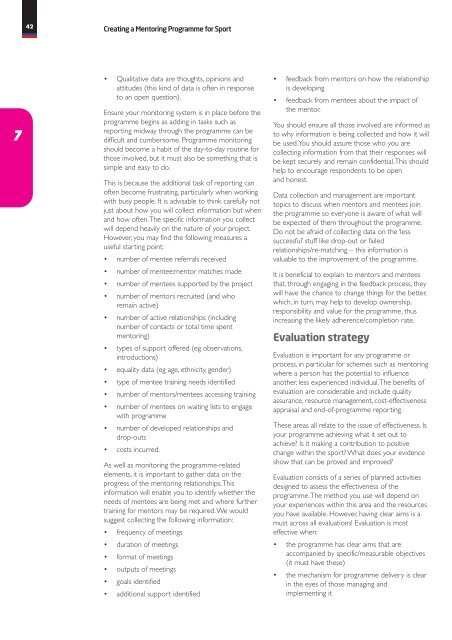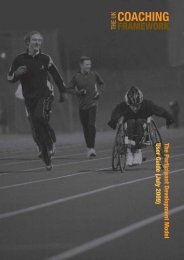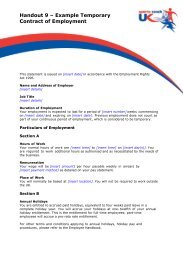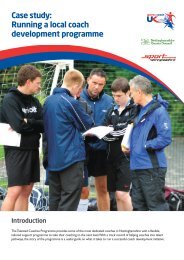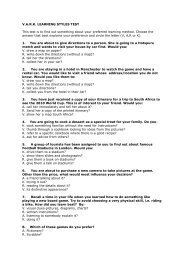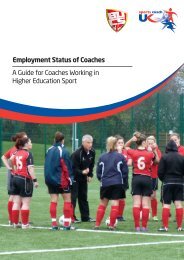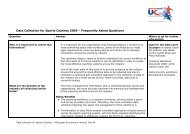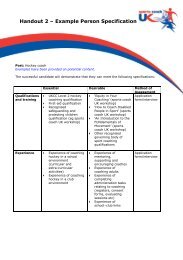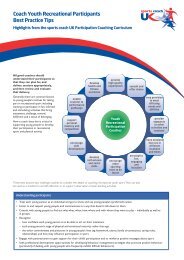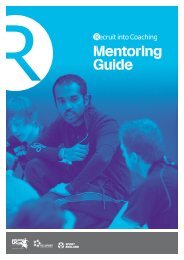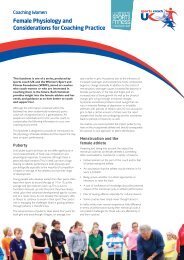Creating a Mentoring Programme for Sport: A ... - sports coach UK
Creating a Mentoring Programme for Sport: A ... - sports coach UK
Creating a Mentoring Programme for Sport: A ... - sports coach UK
Create successful ePaper yourself
Turn your PDF publications into a flip-book with our unique Google optimized e-Paper software.
42<strong>Creating</strong> a <strong>Mentoring</strong> <strong>Programme</strong> <strong>for</strong> <strong>Sport</strong>7• Qualitative data are thoughts, opinions andattitudes (this kind of data is often in responseto an open question).Ensure your monitoring system is in place be<strong>for</strong>e theprogramme begins as adding in tasks such asreporting midway through the programme can bedifficult and cumbersome. <strong>Programme</strong> monitoringshould become a habit of the day-to-day routine <strong>for</strong>those involved, but it must also be something that issimple and easy to do.This is because the additional task of reporting canoften become frustrating, particularly when workingwith busy people. It is advisable to think carefully notjust about how you will collect in<strong>for</strong>mation but whenand how often. The specific in<strong>for</strong>mation you collectwill depend heavily on the nature of your project.However, you may find the following measures auseful starting point:• number of mentee referrals received• number of mentee:mentor matches made• number of mentees supported by the project• number of mentors recruited (and whoremain active)• number of active relationships (includingnumber of contacts or total time spentmentoring)• types of support offered (eg observations,introductions)• equality data (eg age, ethnicity, gender)• type of mentee training needs identified• number of mentors/mentees accessing training• number of mentees on waiting lists to engagewith programme• number of developed relationships anddrop-outs• costs incurred.As well as monitoring the programme-relatedelements, it is important to gather data on theprogress of the mentoring relationships. Thisin<strong>for</strong>mation will enable you to identify whether theneeds of mentees are being met and where furthertraining <strong>for</strong> mentors may be required. We wouldsuggest collecting the following in<strong>for</strong>mation:• frequency of meetings• duration of meetings• <strong>for</strong>mat of meetings• outputs of meetings• goals identified• additional support identified• feedback from mentors on how the relationshipis developing• feedback from mentees about the impact ofthe mentor.You should ensure all those involved are in<strong>for</strong>med asto why in<strong>for</strong>mation is being collected and how it willbe used. You should assure those who you arecollecting in<strong>for</strong>mation from that their responses willbe kept securely and remain confidential. This shouldhelp to encourage respondents to be openand honest.Data collection and management are importanttopics to discuss when mentors and mentees jointhe programme so everyone is aware of what willbe expected of them throughout the programme.Do not be afraid of collecting data on the ‘lesssuccessful’ stuff like drop-out or failedrelationships/re-matching – this in<strong>for</strong>mation isvaluable to the improvement of the programme.It is beneficial to explain to mentors and menteesthat, through engaging in the feedback process, theywill have the chance to change things <strong>for</strong> the better,which, in turn, may help to develop ownership,responsibility and value <strong>for</strong> the programme, thusincreasing the likely adherence/completion rate.Evaluation strategyEvaluation is important <strong>for</strong> any programme orprocess, in particular <strong>for</strong> schemes such as mentoringwhere a person has the potential to influenceanother, less experienced individual. The benefits ofevaluation are considerable and include qualityassurance, resource management, cost-effectivenessappraisal and end-of-programme reporting.These areas all relate to the issue of effectiveness. Isyour programme achieving what it set out toachieve? Is it making a contribution to positivechange within the sport? What does your evidenceshow that can be proved and improved?Evaluation consists of a series of planned activitiesdesigned to assess the effectiveness of theprogramme. The method you use will depend onyour experiences within this area and the resourcesyou have available. However, having clear aims is amust across all evaluations! Evaluation is mosteffective when:• the programme has clear aims that areaccompanied by specific/measurable objectives(it must have these)• the mechanism <strong>for</strong> programme delivery is clearin the eyes of those managing andimplementing it


